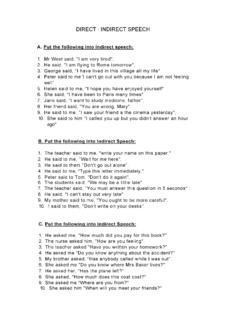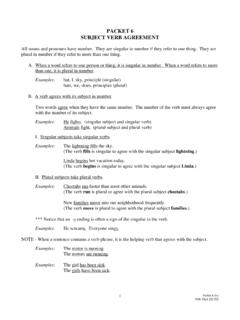Transcription of ARTICLES Exercises A. Insert a or an Indefinite article
1 A. Insert a or an ARTICLES Exercises Indefinite article 1. This is .. orange. 2. That is .. book. 3. This is .. hospital. 4. That is .. egg. 5. He is eating .. apple. 6. This is .. umbrella. 7. That is .. university. 8. I'll be away for .. hour. 9. What .. nice day! horse is .. animal. B. Insert definite or Indefinite ARTICLES , the an, a, where necessary: 1. Greeks like .. coffee. 2. English like .. tea. exercise he is writing is very easy. exercise is good for our health. 5. He lives in .. Japan. 6. Is ,.. Chinese easy? 7.. Chinese language is difficult. 8. Mr. Brown is .. teacher. 9. They took him to .. hospital in .. ambulance 10.. good student work hard. , students must work hard. 12. He is lunch.
2 C. Supply the definite article the, where necessary: 1. study .. history of Crete next year. 2 .. History is an interesting subject. 3.. water in your glass is hot. 4. He always drinks .. cold water. 5. She lives on .. bridge street. 6 .. Mississippi river is .. longest river in .. world. 7. A lot of ships cross .. Pacific Ocean. 8. We drink .. tea out of .. cups. 9 .. tea in this cup is too cold. 10. For me breakfast is .,.. best meal of .. day. D. Put a, an, the, where necessary 1. Napoleon .. great was born in Corsica. best coffee comes from ..Mocha .. town in .. Arabia. Alps are .. longest mountain in Europe. Aegean sea is usually rough. 5. He fell and was taken to .. hospital. 6. We must help .. poor. 7. This is made in .. United Kingdom.
3 Americans like whisky but .. Germans prefer beer. silver is one of the heaviest metals. NOUNS A. Put the sentences into the possessive case, using apostrophes 1. The book of the girl. 2. The bike of Jim. 3. The shoes of the women. 4. The husband of Mrs. West. 5. The toys of the children. 6. The room of Helen. 7. The leg of the dog. 8. The eyes of the cats. 9. The garden of Mrs. Brown. 10. The father of Jean. 11. The brother of Helen. 12. The books of the boys. B. Put the apostrophe In the correct place 1. The childs shoes are under the desk. 2. Where are the boys books? 3. Mr Wests wife is very young. 4. The girls coat is very beautifull 5. The mens ties are on the bed. 6. Helen is at her uncles. 7. They are in Mr Whites garden. 8. The womens hats are on the floor.
4 9. He is at the bakers. 10. Where is your sisters house? 11. How old is Jims mother? 12. Hercules labours are very interesting. , 13. I like very much Seferis poems. 14. W e have a ten minutes break. C. Change the sentences from singular into plural ? 1. There is a mouse under the bed. 2. This is a box. 3. This is a child. 4. There is a goose in the garden. 5. He is a thief. 6. My foot is cold. 7. He has an ox. 8. There is a man there. 9. He is in the bus. 10. He has a nice watch. 11. There is a knife on the table. 12. She has a baby. 13. She is a beautiful woman. 14. This is a red dress. 15. He is a boy. 16. This is a big city. 17. This leaf is green. 18. This is a loaf of bread. 19. She is in the bookshop. 20. He wears a nice scarf. D. Choose the correct verb form: 1.
5 Money (are, is) not very important for me. 2. His scales (is, are) not correct. 3. My father's advice (is, are) very useful. 4. The fish in your plate (is, are) small. 5. The news (is, are) very bad. 6. Where (is, are) your glasses. 7. My furniture (is, are) very old. 8. My luggage (is, are) very heavy. 9. Information (is, are) always useful. 10. The police (is, are) looking for the thief. E. Use much or many. 1. He drinks .. water. 2. She has .. friends. 3. The spend .. money on books. 4. Mary doesn't eat .. fish. 5. We don't have .. information about his life 6. There is not .. milk in the cup. 7. He has .. books. 8.. people believe this story. 9. He carries .. luggage. 10. Germans drink .. beer. F. Much or many? 1. How .. books do you have?
6 2. How .. does this desk cost? 3. How .. milk do you drink? 4. How .. people are there in the street? 5. How .. money do you spend? 6. How .. is a kilo of apples? 7. How .. flour did you buy? 8. How .. teachers do you know? 9. How .. wheat is there in the bag? 10. How .. butter do you use? G. Translate into English: 1.. 2. ; 3.. 4.. 5.. 6. , 7.. 8.. 9.. 10.. 11.. 12.. 13.. 14. 4 . 15.. 16.. 17.. 18.. Put much, many, a lot (of) plenty (of) 1. I don't put .. sugar in my tea. 2. Does your baby drink .. milk? Yes she drinks .. 3. Do you eat .. bread? Yes, l eat .. of it. 4. They haven' friends, but I have .. friends 5. His children don't make .. noise, 6. I time on my English Exercises .
7 7. How .. times a year do you paint your room? 8. Do you spend .. money on books? Yes I spend .. 9. How .. people were there at the party? 10. I don't make .. mistakes in spelling. 11. Do you know .. people here? Yes I Know .. 12. How .. days are there in a month? 13. He drinks .. water during his meals. 14. How .. time do you spend reading? 15. He puts .. salt in his salad. 16. Do you have .. money? 17. She uses .. butter in the cakes. 18. They sell .. coffee here. 19. She doesn't type .. letters. 20. Mr. Brown smokes .. 21. There are .. books on the shelves. 22. Do you buy .. soap? 23. They sell .. rice here. 24. Does he smoke .. cigarettes? Yes he 25. There are .. of students in the classroom. Circle all the words that rhyme with gold: ADVERBS A.
8 Put the correct adverb: 1. Helen is very quick. She runs .. 2. Jean is clever She answers all the questions .. 3. His accent is clear. He speaks .. 4. Peter's work was hard. He worked .. 5. Mary has a beautiful voice. She sings .. 6. I am very slow. I wok .. 7. My father is very careful. He drives very .. 8. He is a fast driver He drives very .. 9. They like nice clothes. They dress .. 10. The girls are very quiet. They stay at home .. 11. This chair is very comfortable You can sit .. 12. This problem is very easy. You can solve it .. 13. The soldiers were brave. They fought .. 14. She is very good at English. She learns it very .. B. Adjective or Adverb? 1. He does his Exercises .. (easy, easily) 2. She is a .. (nice, nicely) singer. 3.
9 Is Helen a .. (clever, cleverly) student? 4. This bed is .. (comfortable, comfortably). 5. He works .. (hardly, hard). 6. She drives very .. (good, well) 7. The cat ran .. (quick, quickly) across the street. 8. The are a .. (happy, happily) couple. 9. He is a very .. (brave, bravely) man. 10. She is a very .. (friend, friendly) person. C. Put the adverbs in the correct place: 1. She comes late (always) 2. They walk home (usually) 3. He has been to England (never) 4. Do they go to the cinema (often)? 5. He stays at home in the evenings (sometimes) 6. He can speak French (hardly) 7. They visit the museums (frequently) 8. Jane arrives late for school (seldom) 9. People buy beef nowadays (rarely) 10. Have you been to Japan? (ever) D. Put the adverbs in the correct order: 1.
10 There weren't many people (last night, at the theatre) 2. Helen played the piano (at my party, last night, beautifully) 3. She spoke Italian (very well, when she was young) 4. Peter was born (on May 2nd, at 5 in the afternoon, in 1990) 5. They went (to Italy, 3 years ago, by plane) 6. We will meet (tomorrow morning, outside my office, at 6 o'clock) 7. George works (in the factory, hard, every day) 8. She arrived (in Athens, at 5 o'clock, yesterday) 9. I have breakfast (very early, in the kitchen, every morning) 10. I took her (yesterday evening, to the hospital). E. Answer these questions: 1. What day, what year and what time were you born? 2. Where and when did you go fishing? 3. How and when will you leave for England? 4. How, where and when will you write your Exercises ?




